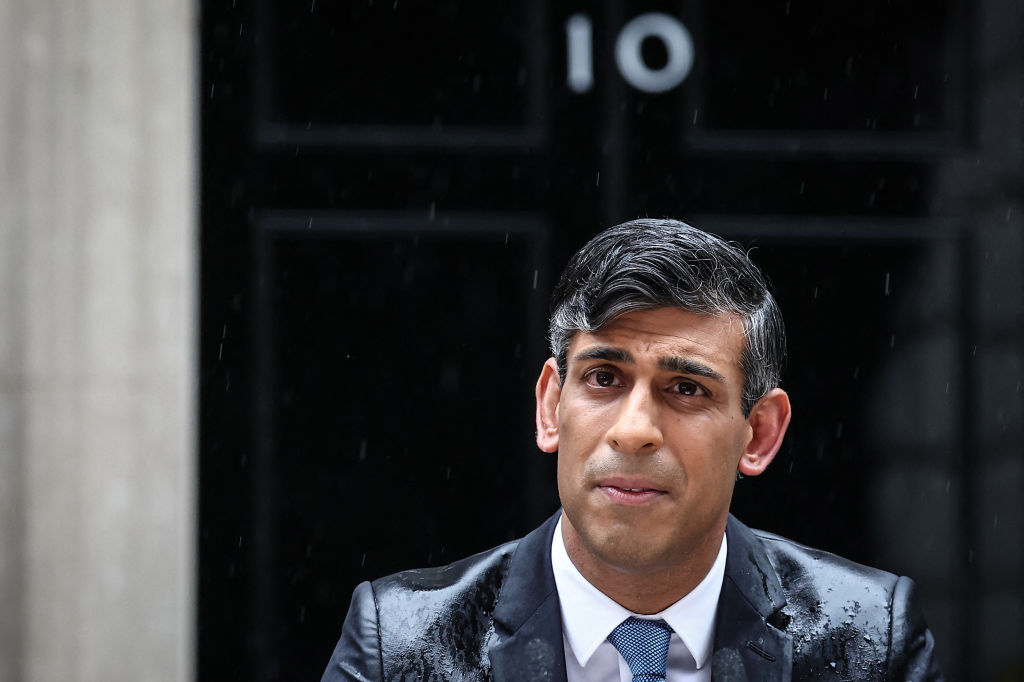When Britain’s prime minister, Rishi Sunak, stood in the pouring rain last week to announce a general election, there could hardly have been a less auspicious beginning to the Conservative Party’s campaign. In the space of a few days, it has gone downhill from there.
Eighty-five Tory MPs have shown their confidence in their party’s ability to win another term by declaring their retirement. These include the former PM Theresa May, long-serving minister Michael Gove, and erstwhile Tory leadership contender Andrea Leadsom. Twenty-two of these MPs have served in the Commons for fewer than ten years, and ten of them were only elected in 2019.
[…]
They are right to be worried. What is happening to the Tories is the culmination of the long-term decline and decomposition of their vote, which was accelerated by Brexit, Boris Johnson, the Truss debacle, and Sunak’s time in office. As I have argued in detail elsewhere, during the 2010s, the party became increasingly dependent on a coalition of propertied interests, with its core mass base provided by elderly voters.These layers of the electorate were shielded from the direct consequences of the 2010–15 Conservative–Liberal Democrat coalition government through protection of pensioners’ incomes via the “triple lock” — a guarantee the state pension would rise in tandem with average earnings, inflation, or a baseline figure of 2.5 percent (whichever is the highest).
Deft manoeuvring around the “need” for cuts and judicious scapegoating helped ensure the Tories then escaped the political consequences of systematic cuts to public services, especially the National Health Service, that this demographic cohort depends on. But there was more to this loyalty than the consequences of Tory policy from 2010 onward.
First of all, there is the social location of being a pensioner. Because the incomes of pensioners tend to be fixed and cannot be made good in an emergency by reentering employment, their experience is analogous to that of the petty bourgeoisie. As many Marxists have observed, dependence on one’s own modest capital and ability to labo[u]r produces a political disposition toward stability and a hostility to real and imagined threats.
[…]
The second factor, which you might call the “strong force,” comes from [pensioner’s] tendency to acquire property over time. […] This has had two significant political consequences. For the elderly property owner, it has strengthened the tendency to right-wing, authoritarian politics that was already latent in the social location of pensioners. In contrast, for younger people — today’s under-fifties — the housing shortage has severed the link between aging and the propensity to vote for the Right which, in the British case, means the Conservatives.
[…]
Sunak’s election campaign is the last gasp of a historically exhausted party. The task of trying to turn the situation around by appealing to working-age people is difficult, because his own political outlook (and that of the Tories in general) seeks to undercut any demands made on the state.Steps to addressing the housing shortage would cut against the interest that the existing Tory coalition has in keeping property values high and maintaining the private rental sector. A move away from a politics of scapegoating would deprive the Tories of a tried-and-tested method of binding their supporters together.
As a result of Johnson’s stupidity, Truss’s recklessness, and Sunak’s do-nothing attitude, the age at which someone is more likely to vote Tory has more than doubled since 2019, from thirty-nine to seventy. To prevent complete disintegration at this hour, all the Tories can do is double down and hope there will be a viable enough rump left from which to fight back after the election. Even such a limited measure of success could well prove to be out of their reach.



Sure, they seemed like a solid choice on paper in 2010 too. Do not vote Lib Dem.
Who do I vote for then conservatives are shite. Labour are shite. There aren’t really any good choices. I at least agree with a lot of the lib dem policies.
If you align mostly with the Lib Dems, then vote for them, unless your absolute priority is to keep the Tories out and then you should vote tactically.
If we didn’t vote for a party based on a single broken promise from over a decade ago then nobody would vote for anyone.
Gotta accept that there aren’t any good choices and use a protest vote or spoiled ballot to indicate your willingness to engage and displeasure at the options. Personally, I’m going to be writing in Jezza. Maybe Xi.
People always seem caught up on this - as they should do, but people never seem to treat other parties broken pledges the same way. “I got screwed over by the Lib Dems in 2010, therefore I’ll never vote for them and vote Labour instead” - a party who have broken probably at least 100x as many pledges and made numerous U-turns. Labour promised electoral reform when they’d get in power and then immediately abandoned it, a change would have totally transformed British politics.